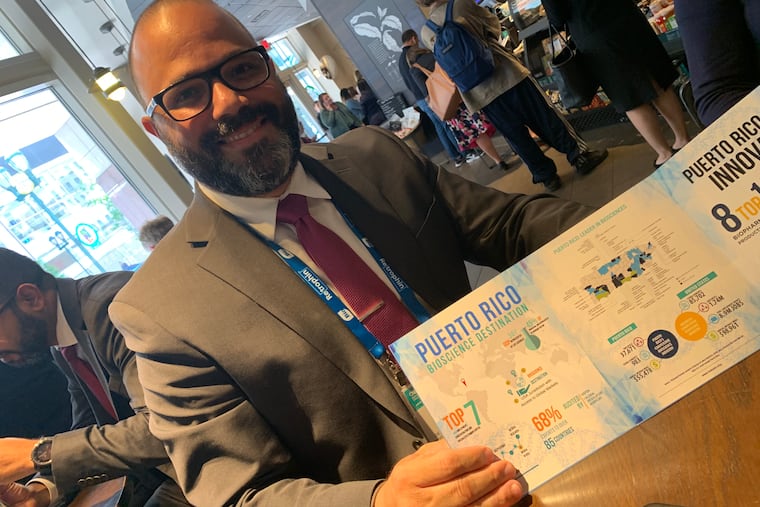Puerto Rico, eager to keep its pharma industry, targets drug, device makers at BIO 2019 in Philly
It’s not just about luring employers from the mainland to his island. Puerto Rico wants to make sure the companies there continue investing and expanding.”

For Manuel Laboy, economic development secretary for the government of Puerto Rico, the BIO 2019 Convention, drawing more than 16,000 drug and medical device executives, made Philadelphia the center of the biotech world this week -- and a target-rich environment.
It’s not just about luring employers from the mainland to his island. “For us it’s a top priority to make sure the companies we have continue investing and expanding,” Laboy said over cups of coffee in the Marriott hotel next to the Convention Center on Tuesday afternoon. “They are here, so I came to BIO too."
That morning, for example, "I met with Boehringer Ingelheim -- they are one of our German companies -- we want them to expand their pet health-care operations in Barceloneta. And I’m going to see [drugmaker] AbbVie this afternoon.” The Abbott Labs oncology spin-off has a plant in Jayuya.
Laboy spoke soon after Delaware Gov. John Carney completed an hour answering questions for a hall full of pharma and drug-device guests about that state’s biotech sector, which includes the cancer drugmaker Incyte, which since 2011 has grown from 80 to more than 1,000 at its Wilmington headquarters on the site of a former Wanamakers.
Delaware cut taxes to keep newly separated DuPont Co. and the farm-supply giant Corteva from leaving the state. Carney said employers were increasingly interested in workforce quality. In little Delaware, that includes pointing out the state’s proximity to Philadelphia and Baltimore, where many young college graduates prefer to live, he said. The state is also trying to help rehab half-empty downtown Wilmington as an urban center attractive to young workers.
Carney got extra time because New Jersey Gov. Phil Murphy and Pennsylvania Gov. Tom Wolf weren’t at the event as advertised. (Wolf later spoke at an opiod panel, Murphy received BIO’s Governor of the Year award on Thursday morning.)
Laboy was part of an army of would-be clients and partners working the crowds that pulsed through the four-block-long center. He handed out maps that showed more than 60 U.S. and European pharma, medical-device, and other bioscience facilities across the island that employ more than 37,000 people -- half the island’s total factory workforce -- at average pay of $55,500 a year -- about 23 percent less than on the mainland but among the best-paid private-sector jobs in Puerto Rico.
The island’s colleges graduate 1,000 new engineers a year, and those who want to stay value biotech jobs. Laboy says they proved their loyalty when they kept coming to work after the 2017 hurricanes knocked out power and other public services to the island and killed 3,000. He said senior officers of several of the largest U.S. pharma companies visited the island “under the radar to meet personally the heroes that made sure their operations continued to stand up and deliver drugs to their different markets.”
U.S.-based Amgen, Bristol-Myers, Johnson & Johnson’s Ortho and Jansen divisions, Merck, and Medtronic, along with chemical makers such as Wilmington-based Corteva Agriscience, Syngenta Seeds, and BASF, are among the international employers that have kept plants on the island, despite the demise of popular federal tax breaks. Instead, firms have used other tax exemptions and a manufacturing-tax-funded incentive program that gives out $80 million in aid and incentives each year, Laboy said.
Romark, GK Pharma, China-based PuraCap, and Italy-based Copan Diagnostics are among companies that have added plants in Puerto Rico since the 2017 devastation. And Puerto Rico-based biotech companies are growing, including CDI Labs in Mayagüez, which now employ 130, up from 10 in 2010. “They have a potential to become a player in the global market,” Laboy said.
Biotech is about more than research and manufacturing. Puerto Rico is promoting the island as a center for “centralized management services, call centers,” and other back-office operations that can be designated “export services” under U.S. law and qualify for a lower tax rate. And given the island’s location between Europe, the United States, and Latin America, “we want to encourage multinationals to consider us as a link in the supply chain” that also brings in local suppliers.
But low wages and a convenient location aren’t enough by themselves to sustain foreign interest or persuade firms to keep investing so plants grow instead of closing, Laboy added.
Echoing Delaware’s Carney, he said employers seek skilled labor. So education and “workforce development” are the best ways for a region to distinguish itself as a work site. “We focus on moving forward” with a new generation of workers, he concluded. “We’re very active in developing apprenticeship programs -- union and nonunion. And we’re always putting together new incentives.”